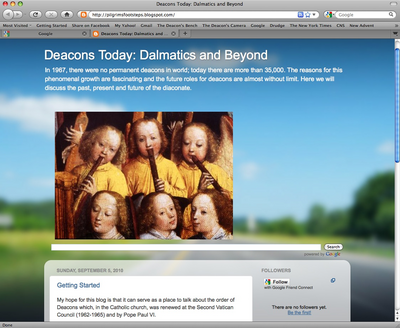
I’m delighted to welcome to the blogosphere my friend and sometime partner-in-crime, Deacon Doctor Bill Ditewig (Triple D). (Pause here while all those wearing dalmatics offer a standing ovation.)
He’s just launched a shiny new blog on the diaconate called “Deacon’s Today: Dalmatics and Beyond,” and it promises to be a treasure trove of deacon-y goodness.
Deacon Bill begins by noting:
Deacons were mentioned in the New Testament and in the earliest writings of the Church. The proto-martyr of the New Testament, in fact, is often associated with the diaconate: St. Stephen (even though he is never referred to as a deacon in scripture). In the first centuries of the Christian Church, deacons are described as extending the ministry of Christ Himself, especially to those most in need.
Then, for a variety of reasons, the diaconate was absorbed into an increasingly rigidized clerical structure adapted from the late Roman empire, eventually become little more than a stage on the way to ordination as a presbyter. For more than a millennium this became the norm.
Vatican II changed all that, and for the first time in centuries, it was possible to ordain someone to a major order of ministry that was not destined for the priesthood. The history of that development is fascinating in its own right, involving developments in European Protestantism, post-Enlightenment philosophy and, later, the horrors of world war. In particular, a major impetus behind the renewal of the diaconate was at Dachau Concentration Camp. All of this, and more, means that trying to understand the diaconate in the contemporary church is a complex thing, involving moving beyond language that has developed to talk about the priesthood and which may or may not apply to diaconate, the relationships of laity and deacons, and so much more.
I couldn’t be happier to have him joining all us deacons here on the web. Visit his blog, bookmark it, and make it a regular destination.
Knowing Bill, I’m sure there’s going to be great stuff there.
Welcome, brother! And, of course, ad multos annos!

